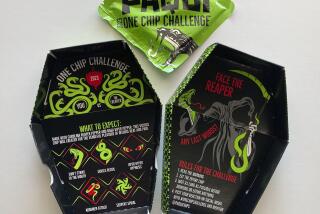Health : Spicy Food No Sweat for the Stomach
- Share via
Wolfing something loaded with jalapenos at a favorite Mexican restaurant or polishing off pepperoni pizza at a special Italian joint may make you gasp, sweat, reach for your water glass and wish you’d ordered something else, but it won’t rot your insides.
That’s the conclusion of a team of Texas researchers who turned the light of scientific inquiry on a surprisingly shadowy area of health: What spicy food does to people who eat it and--more important, perhaps--why.
In the process, the team at Baylor College of Medicine and the Houston Veterans Administration Medical Center has added to the international understanding of the body’s response to capsicum , a complex pain-stimulating family of chemicals that is to blame for the perceived hotness of virtually every red peppery spice in the kitchen--from paprika through jalapenos to cayenne pepper. It includes every chili known to humankind.
Old Wives’ Tales
Explaining his interest in such an earthy matter, Dr. David Graham, who headed the research team, said simply, “I’m always interested in what’s going on in people’s stomachs.”
Graham’s research, which was published last week in the Journal of the American Medical Assn., sought to test the belief that the stomach lining is actually damaged, even temporarily, by high concentrations of spices rich in capsicum , or its pungent active ingredient, capsaicin .
That belief is the foundation of the almost-folkloric bland-diet recommendation frequently given to those who suffer a wide variety of gastrointestinal ailments, Graham said in a phone interview. “This goes back to the time when we really didn’t have any medicines (that would work) and all we could really offer people was some change in diet or to purge them or bleed them,” he said. “We still have (that tendency). We commonly tell people, ‘Take a bland diet.’ ”
To test the hypothesis, Graham arranged an unusual bit of research. He recruited 12 subjects--men and women aged 24 to 43. Then, he fed them a range of diet items over several days. The menu included broiled, lean steak with unseasoned peas and baked potato washed down with distilled water, a packaged Mexican meal enhanced with an extra jolt of jalapenos and picante sauce and a New York-style pizza pepped up with a enough pepperoni to assure heartburn in any normal person.
Aspirin Effect Tested
After each meal, Graham and other physicians slipped fiber-optic tubes down the subjects’ throats so the researchers could take a close-up look at what was happening in their stomachs each time they ate. The study also included aspirin taken with the blander meals to separately test whether the drug can mitigate the effects of spicy food on the digestive tract.
And for a coup de grace , Graham even used his endoscope--as the fiber-optic instrument is called--to spray a little blast of jalapeno juice right on the stomach lining itself.
The result: Even the spiciest meals did not cause any lasting damage to the stomach. The aspirin didn’t seem to make much difference. The Graham team quickly emphasized, however, that none of this means the foods are comfortable to eat.
“We conclude that although capsaicin -containing spices increase gastric acid secretion and their use may be associated with with gastric distress,” the Houston researchers wrote, “they add to the flavor and enjoyment of eating and do not appear to cause (stomach lining) damage.”
Capsicum -containing foods belong to a plant family called Solanaceae. Tabasco sauce depends on them. The family does not include black pepper, however, which has chemistry of its own based on a substance called piperine.
Dr. Victor Herbert, an internationally known nutrition expert at the Bronx Veterans Administration Medical Center in New York, said that the new Graham study adds important information to the fledgling science of taste-understanding. “It suggests that these spices do not harm,” Herbert said. “Previously, it was thought that they do.”
Dr. Spencer Shaw, a colleague of Herbert’s in New York, said the new study underscores the complexity of food sensation--a little-researched field. “You’re really talking about sensory perception,” Shaw said. “The basic perception of taste is an area of complex physiology.”
Hot foods seem hot, Graham and a handful of other experts said, because the molecular structure of the capsicum family is capable of activating a brain chemical called substance P. Substance P, in turn, is a complex amino acid that, among other things, plays a pivotal role in the brain’s pain response.
The body’s reaction to substance P stimulation is the sensation of searing heat in the mouth and throat, skin irritation and bronchial spasm. A few people break into a sweat at the first taste of such foods, but Graham said that anyone will start perspiring after eating a large enough quantity. The sweating part of the syndrome, he added, is strictly dose-related and no one is immune.
In other words, you like hot foods because they hurt you.
It’s a matter of nerves, Graham said. “These nerves convey whatever sensation they’re designed to carry. There are nerves that convey pain and nerves that convey sweet taste. You eat something spicy, with peppers in it. That fires the nerve. And then you feel it.”






